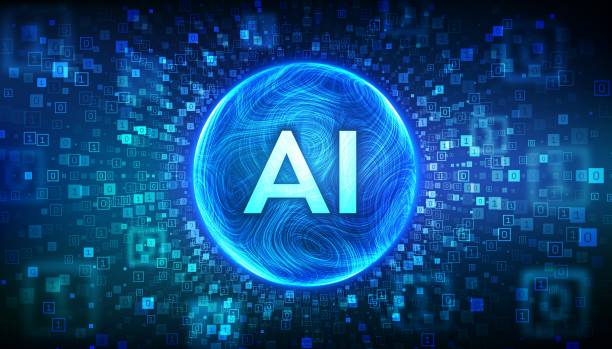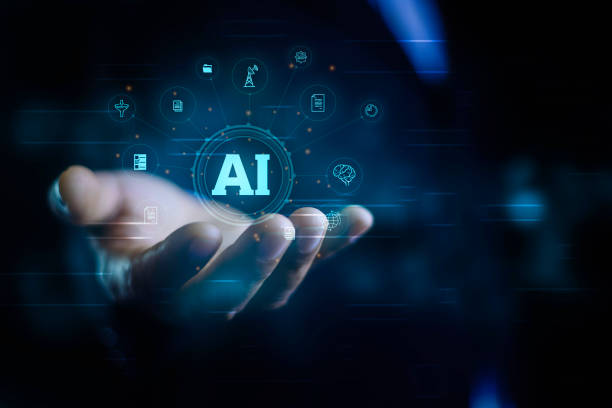What is Artificial Intelligence? Definition, History, and Key Concepts

Artificial Intelligence (AI) is a branch of computer science that deals with building intelligent machines and systems. These systems are capable of performing tasks that usually require human intelligence, such as learning, reasoning, problem-solving, and language understanding. #Artificial_Intelligence is essentially an effort to simulate human thinking processes in machines. The history of artificial intelligence dates back to the 1950s when scientists such as Alan Turing and John McCarthy began exploring the possibility of building thinking machines. Key concepts in artificial intelligence include machine learning, neural networks, natural language processing, and computer vision. These concepts allow AI systems to learn from data, recognize patterns, understand language, and process images.
From the beginning of artificial intelligence, researchers have sought to create systems that can think and act like humans. These efforts have led to the development of complex algorithms and models capable of performing various tasks. Today, artificial intelligence is used in various fields, including medicine, engineering, marketing, etc., and helps to improve efficiency and accuracy in these areas.
Does your company’s website perform as your brand deserves? In today’s competitive world, your website is your most important online tool. Rasaweb, a specialist in professional corporate website design, helps you to:
✅ Attract the credibility and trust of customers
✅ Convert website visitors into customers
⚡ Get a free consultation!
Types of Artificial Intelligence Approaches and Classifications

Artificial intelligence can be categorized based on capabilities and different approaches. Based on capabilities, there are two main types of artificial intelligence: Narrow AI and General AI. Narrow AI is designed to perform specific tasks and specializes in the same area, such as facial recognition systems or voice assistants. In contrast, General AI seeks to create systems that are capable of performing any task that a human can perform. This type of artificial intelligence is still in the research stages.
Based on approaches, we can refer to machine learning, deep learning, expert systems, and robotics. Machine learning allows systems to learn from data without being explicitly programmed. Deep learning is a subset of machine learning that uses deep neural networks to process data. Expert systems use specialized knowledge to solve complex problems. Robotics also deals with the design and construction of robots that are capable of performing physical tasks. Each of these approaches has its own advantages and disadvantages, and they can be used depending on the needs of the project. The development of artificial intelligence is currently focused more on Narrow AI, but research to achieve General AI also continues.
Machine Learning and Deep Learning: The Main Pillars of Artificial Intelligence

Machine Learning and Deep Learning are two fundamental concepts in artificial intelligence. Machine learning allows systems to identify patterns and make accurate predictions using data. This process is done without the need for explicit programming, meaning that the system can automatically improve by observing data. Machine learning algorithms are diverse, and each is suitable for a specific type of problem, including regression, classification, and clustering.
Deep learning is a subset of machine learning that uses deep neural networks to process data. These networks are composed of multiple layers that allow the system to identify more complex patterns. Deep learning has been very successful in areas such as image recognition, natural language processing, and voice recognition. For example, facial recognition and machine translation systems use deep learning algorithms. Both machine learning and deep learning methods play a vital role in the development of intelligent systems and enable them to operate with greater accuracy and efficiency.
Table 1: Comparison of Machine Learning and Deep Learning
| Feature | Machine Learning | Deep Learning |
|---|---|---|
| Data requirement | Less | More |
| Complexity | Less | More |
| Hardware requirement | Less | More |
| Applications | Broad | Specialized |
Applications of Artificial Intelligence in Various Industries

Artificial intelligence is currently used in various industries and helps to improve their performance and efficiency. In the field of medicine, artificial intelligence is used to diagnose diseases, develop drugs, and provide personalized healthcare. Image recognition systems can analyze medical images and identify signs of disease. In the automotive industry, artificial intelligence plays an important role in the development of self-driving cars. These cars use sensors and artificial intelligence algorithms to understand their surroundings and drive safely.
In the financial field, artificial intelligence is used to detect fraud, manage risk, and provide personalized financial services. Machine learning algorithms can identify suspicious patterns in financial transactions and prevent fraud. In the retail industry, artificial intelligence is used to improve the customer experience, manage inventory, and provide personalized offers. Product recommendation systems can suggest appropriate products based on customers’ purchase history. These are just a few examples of the wide range of applications of artificial intelligence in various industries, and it is expected that the role of artificial intelligence in these industries will increase in the future.
Do you dream of a thriving online store but don’t know where to start?
Rasaweb is your comprehensive solution for designing an online store website.
✅ Attractive and user-friendly design
✅ Increase sales and revenue⚡ Get a free consultation
Advantages and Disadvantages of Using Artificial Intelligence

The use of artificial intelligence has numerous advantages and disadvantages that should be considered. The main advantages of artificial intelligence include increased efficiency, reduced errors, and improved decision-making. Artificial intelligence systems can automatically perform repetitive and tedious tasks, which leads to increased productivity and reduced costs. Also, artificial intelligence can analyze data more accurately and make better decisions.
However, the use of artificial intelligence also has disadvantages. One of the main disadvantages is the high cost of developing and implementing artificial intelligence systems. These systems require large data, powerful hardware, and technical expertise. There are also concerns about job losses due to the replacement of human labor with artificial intelligence systems. Ethical issues are also among the important challenges in using artificial intelligence, such as protecting privacy and preventing discrimination. For the successful operation of artificial intelligence, these advantages and disadvantages must be considered, and appropriate strategies must be adopted.
Ethical and Social Challenges of Artificial Intelligence

The development and use of artificial intelligence bring significant ethical and social challenges. One of the most important of these challenges is the issue of privacy. Artificial intelligence systems need to collect and analyze large amounts of data to function effectively, which can lead to a violation of people’s privacy. Another challenge is the issue of discrimination. If the data used to train artificial intelligence systems is biased, this bias will also be reflected in the decisions of the systems. This issue can lead to social inequalities.
The issue of accountability is also among the important challenges. If an artificial intelligence system makes an incorrect decision that leads to damage, it is difficult to determine responsibility. Should the system developer, the user, or the system itself be held responsible? These questions require careful examination and the development of appropriate laws and regulations. In addition, there are concerns about the impact of artificial intelligence on the labor market and job losses. To face these challenges, cooperation between governments, companies, and researchers is needed to ensure the responsible development and use of artificial intelligence.
The Future of Artificial Intelligence: Key Trends and Predictions

The future of #Artificial_Intelligence is very bright and full of new opportunities. It is expected that in the coming years, artificial intelligence will play a more prominent role in everyday life and various industries. One of the key trends is the development of Artificial General Intelligence (AGI), which can perform tasks that currently only humans are capable of. Significant advances in machine learning and deep learning are taking place, allowing artificial intelligence systems to operate with greater accuracy and efficiency. It is predicted that in the future, artificial intelligence will create major transformations in areas such as healthcare, education, transportation, and energy.
However, to achieve this bright future, we must pay attention to the ethical and social challenges of artificial intelligence and find appropriate solutions for them. The responsible development and use of artificial intelligence can help to improve the quality of human life and advance societies. Also, there is a need to invest in education and the development of skills related to artificial intelligence so that the workforce can adapt to the changes caused by this technology.
Table 2: Key Predictions of Artificial Intelligence
| Year | Prediction |
|---|---|
| 2025 | Artificial intelligence is widely used in various industries. |
| 2030 | Self-driving cars become an everyday reality. |
| 2035 | Artificial General Intelligence (AGI) reaches an acceptable level. |
| 2040 | Artificial intelligence plays a key role in major decision-making. |
Training and Learning Artificial Intelligence Resources and Paths

To enter the field of artificial intelligence, you need continuous training and learning. Fortunately, there are numerous educational resources and paths for learning artificial intelligence. You can use online courses, books, articles, and conferences to gain the necessary knowledge and skills. Online courses offered by reputable universities and institutions such as Coursera, edX, and Udacity can be a great starting point. These courses usually cover topics such as machine learning, deep learning, natural language processing, and computer vision.
Books and scientific articles are also valuable resources for deeper learning. You can use reference books and articles published in reputable conferences to understand advanced concepts. Also, attending conferences and training workshops can help you to become familiar with the latest advances and trends in artificial intelligence and to connect with experts in this field. To succeed in this field, in addition to theoretical knowledge, you also need practical practice and experience. You can strengthen your practical skills by doing small projects and participating in data mining competitions.
You don’t have a corporate website yet and are missing out on online opportunities? With professional corporate website design by Rasaweb,
✅ Double the credibility of your business
✅ Attract new customers
⚡ Free consultation for your corporate website!
The Impact of Artificial Intelligence on the Future of Jobs

Artificial intelligence will have a significant impact on the future of jobs. Some jobs will be completely automated, while other jobs will require new skills. Jobs that involve repetitive and routine tasks are most at risk of being automated. For example, jobs such as data entry, document processing, and telephone customer service may be completely performed by artificial intelligence systems.
On the other hand, jobs that require creativity, critical thinking, and social skills are less at risk. For example, jobs such as managers, engineers, designers, and healthcare professionals will still require human skills. However, even these jobs will be affected by artificial intelligence. For example, artificial intelligence can help doctors diagnose diseases, engineers design structures, and designers create creative designs.
To succeed in the future labor market, you need to develop new skills that complement artificial intelligence. These skills include critical thinking, problem-solving, creativity, communication skills, and leadership skills. Also, you need to learn continuously and adapt to rapid technological changes.
Summary of Key Points and the Outlook Ahead in Artificial Intelligence

In this article, we provided a comprehensive review of artificial intelligence and examined its key concepts, types, applications, advantages and disadvantages, ethical and social challenges, future, and educational paths. #Artificial_Intelligence is a powerful technology that can have a significant impact on everyday life and various industries. However, for the successful operation of artificial intelligence, we must pay attention to its ethical and social challenges and find appropriate solutions for them.
The future of artificial intelligence is bright and full of new opportunities. It is predicted that in the coming years, artificial intelligence will play a more prominent role in our lives and create major transformations in various fields. To prepare for this future, you need continuous training and learning and must develop new skills that complement artificial intelligence. By developing and using artificial intelligence responsibly, we can help to improve the quality of human life and advance societies. Artificial intelligence is rapidly advancing, and this article as a comprehensive guide can help you to have a better understanding of this technology and benefit from its opportunities. The development of artificial intelligence requires the effort and cooperation of various experts to ensure that this technology is used in the best interests of humanity.
Frequently Asked Questions
| Question | Answer |
|---|---|
| 1. What is Artificial Intelligence (AI)? | It is a branch of computer science that aims to create machines capable of simulating human intelligence and performing tasks that require human thinking, such as learning, problem-solving, and decision-making. |
| 2. What are the main types of Artificial Intelligence? | They can be classified into Narrow AI (focused on a specific task), General AI (possessing comprehensive human capabilities), and Super AI (exceeding human intelligence). |
| 3. Mention some common applications of AI in our daily lives. | These include voice assistants (such as Siri and Alexa), recommendation systems (such as Netflix and Amazon), self-driving cars, facial recognition systems, and spam filters. |
| 4. What is the difference between Artificial Intelligence and Machine Learning? | Artificial Intelligence is the broader concept of creating intelligent machines, while Machine Learning is a subset of AI that focuses on enabling systems to learn from data without explicit programming. |
| 5. What is Deep Learning? | It is a subset of machine learning that uses multi-layered artificial neural networks (deep neural networks) to process data and discover complex patterns, and is used in image and speech recognition. |
| 6. What are the most prominent benefits of Artificial Intelligence? | Improving efficiency and productivity, automating repetitive tasks, making better decisions based on big data analysis, and developing solutions to complex problems in fields such as medicine and science. |
| 7. What are the main challenges facing the development and deployment of Artificial Intelligence? | These include the need for vast amounts of high-quality data, privacy and security issues, bias in data and algorithms, and high development and maintenance costs. |
| 8. Does Artificial Intelligence raise ethical or social concerns? | Yes, it raises concerns related to privacy, algorithmic bias, job losses due to automation, and responsibility for errors committed by intelligent systems, and the need for a regulatory framework. |
| 9. How can Artificial Intelligence affect the future of the labor market? | It can lead to the automation of some routine jobs, but it will also create new jobs that require advanced skills in developing, operating, and maintaining AI systems. |
| 10. What are some modern or promising technologies in the field of Artificial Intelligence? | These include advanced Natural Language Processing (NLP) (such as large language models like ChatGPT), computer vision, robotics, and Generative AI. |
And other services of Rasa Web Advertising Agency in the field of advertising
Intelligent Sales Automation: Professional optimization to increase sales using attractive UI design.
Intelligent Brand Identity: An effective tool for user interaction with the help of intelligent data analysis.
Intelligent Brand Identity: Transform your click-through rate with the help of intelligent data analysis.
Intelligent Reportage: A combination of creativity and technology to increase click-through rate by using real data.
Intelligent Digital Advertising: An effective tool for managing campaigns with the help of key page optimization.
And more than hundreds of other services in the field of internet advertising, advertising consulting, and organizational solutions
Internet Advertising | Advertising Strategy | Advertisement Reportage
Resources
Artificial Intelligence in Simple Language – Part 1
,Faradars Artificial Intelligence Articles
,What is Artificial Intelligence? – IBM
,What is Artificial Intelligence? – Maktab Khooneh
? Are you ready to transform your business in the digital world? Rasaweb Afarin, with expertise in secure website design and comprehensive digital marketing services, is your reliable partner for reaching the peaks of success.
📍 Tehran, Mirdamad Street, next to the Central Bank, South Kazerun Alley, Ramin Alley, No. 6



